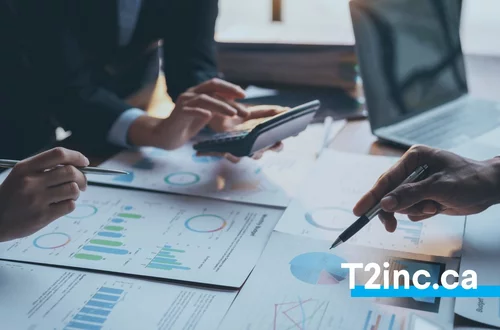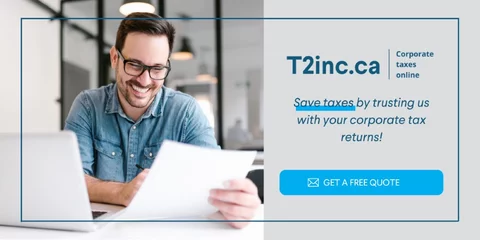Tax planning strategies for Small Business Owners: how to reduce corporate taxes in Canada?

In Canada, tax obligations pose a significant challenge to corporate profitability. Without the right tax-efficient strategy, companies risk not only paying more taxes than necessary but also missing valuable opportunities for financial optimization.
That’s where tax planning comes in. More than just managing tax obligations, it helps reduce the tax burden while ensuring compliance with current tax laws. A well-structured financial plan allows businesses to save, optimize tax deductions, and make strategic investments in capital property that support long-term growth.
In this article, we’ll explore key tax planning strategies that can help reduce your company’s tax liability and ensure its sustainability in 2025 and beyond.
What is tax planning? Tax planning Definition
Tax planning is a tax-efficient strategy that enables companies, including private corporations, to help reduce their taxable income while complying with current tax laws. This isn’t about tax-free loopholes or tax avoidance—it’s about structured financial planning of capital gains and losses, revenue, and expenses to optimize profitability.
Why is this important to your business?
In Canada, a corporation has several tax obligations:
- Corporate tax returns (T2, CO-17 in Quebec)
- Installment payments
- Sales tax management (GST/QST)
- Compliance with tax laws and regulations
Without a proper tax plan, businesses may overpay taxes, fail to qualify for tax advantages, and even face penalties due to errors or omissions.
The main benefits of tax planning for your business
Good tax planning isn’t just about helping reduce taxes. It also optimizes financial management, ensures compliance with tax services, and fosters business growth. Here are the key strategies that can provide tax advantages for your business.
1. Reduce the tax burden
The goal of tax planning is to minimize the tax burden by optimizing deductions, tax credits, and strategic investments.
How to reduce your business taxes:
- Optimize tax deductions: many expenses, such as capital property, rent, supplies, life insurance policies, and real estate leasing, can be deducted.
- Take advantage of available tax credits: Canada offers several tax incentives to reduce the tax burden on businesses, including:
- The SR&ED tax credit (scientific research and experimental development)
- The Small Business Deduction (SBD), which reduces the tax rate for SMEs
- The investment credit for equipment purchases.
- Properly structuring the personal compensation of shareholders to optimize income taxes.
2. Improved cash flow and cash management
Effective tax planning allows you to anticipate cash outflows and better manage your company's net income.
How can you improve the tax management of your cash flow?
- Anticipate tax payments: installments must be well planned to avoid penalties.
- Maximize tax deferrals: certain expenses can be deferred to future years to better balance the tax burden.
- Maximize investments (RRSPs, TFSAs) and capital gains to optimize taxation.
- Plan estates and asset transfers for taxpayers to limit tax liability.
- Plan dividends and shareholder remuneration to smooth cash flows.
3. Protection and compliance
Tax mismanagement can result in capital losses, penalties, fines, and even audits by the Canada Revenue Agency (CRA) and Revenu Québec.
How can you avoid tax risks?
- Respect year-end tax deadlines and obligations: failure to report income or pay taxes on time can result in penalties.
- Structure your business correctly to limit the risk of tax disputes.
- Maintain accurate accounting records and keep the necessary documents in case of an audit.
4. Optimize growth and investment
Tax planning makes it possible to implement tax optimization strategies that promote business development by maximizing the cash available for investment.
How can taxation be used to promote growth?
- Take advantage of tax incentives for investment (e.g. capital cost allowances, innovation credits).
- Optimize business transfers to reduce estate costs and maximize shareholder value.
- Plan for tax loss reporting to smooth the tax burden and improve profitability.

Key tax planning strategies for SMEs in Canada
Good tax planning doesn't just happen. It's based on proven strategies to optimize your company's income, expenses and tax obligations.
Incorporation: an advantageous solution for reducing taxes
One of the first tax decisions you must make as a business owner is the choice of legal status. Should you incorporate or remain self-employed? This decision has a major impact on your tax situation.
What are the tax advantages of incorporation :
- Preferential tax rate: unlike individuals who can be taxed up to 53.31% in Quebec, a corporation benefits from a reduced tax rate of 12.2% on the first $500,000 of profits.
- Tax deferral: you are taxed personally only on the income you earn from your business. This allows you to defer a portion of your taxes and optimize your compensation.
- Protection of personal assets: unlike a sole proprietorship, a corporation protects your personal assets in the event of debts or lawsuits.
Let's take the example of a consultant who earns $100,000. If he's self-employed, that income will be fully taxed at his personal rate, up to 40%, or about $40,000 in taxes. On the other hand, by incorporating, he benefits from the reduced SME tax rate (12.2% on the first $500,000). This means that the tax on his business income would be about $12,200. He can then strategically choose to pay himself a salary or dividends, reducing his personal tax bill and optimizing his cash flow.
Salary or dividends: which is better?
Owners of corporations face an important choice when it comes to compensation: should they pay themselves a salary or a dividend? Each option has its advantages and must be adapted to the entrepreneur's situation.
How to choose between salary and dividends:
- Salary: allows you to contribute to public plans (QPP/CPP), maximize your RRSP contribution limits and reduce your company's taxable income.
- Dividends: less taxed than salary, but not eligible for public benefits (Employment Insurance, QPP).
For example, a business owner who relies on QPP benefits for retirement would be well advised to pay himself a salary in order to accumulate rights. Conversely, if you want to maximize your after-tax income, you may want to take a larger share of dividends. If you want to maximize your situation, we offer a Salary/Dividends consultation to analyze your situation and provide you with sound advice.
Take advantage of the tax credits available
Canada offers a number of tax credits to encourage businesses to innovate and invest. If you're not taking advantage of them, you're leaving money on the table!
Some interesting tax credits for SMEs :
- SR&ED Tax Credit: recovers up to 64% of research and development expenses.
- Canadian Small Business Deduction: reduces the small business tax rate on the first $500,000 of income.
- Training Credit : some provinces offer incentives to help companies finance employee training.
- Investment Credit: Financial assistance for the purchase of equipment and technology.
For example, an artificial intelligence startup that invests $200,000 in R&D can recoup up to $128,000 thanks to the SR&ED program. That's a huge savings that allows them to invest more in innovation!
Maximizing business deductions and expenses
Businesses can deduct many types of expenses to reduce their taxable income. However, many business owners do not take advantage of all that the law offers.
What expenses are deductible:
- Rent and office expenses: if you rent commercial space, these expenses are 100% deductible.
- Travel expenses and business meals: 50% deductible if you can justify their connection to your business.
- Vehicle used for business purposes: gas, insurance and maintenance are partially deductible depending on the business use of a company car.
- Advertising and marketing: expenses to promote your business, including Google Ads and Facebook Ads campaigns.
For example, an entrepreneur who works from home can deduct a portion of his or her rent, electricity and internet based on the square footage used for the business. This can mean significant savings each year.
Planning for the transfer and sale of your business
If you ever plan to sell or transfer your business, it's important to prepare for the transition from a tax perspective. Poor planning can be very costly in terms of taxes.
Strategies to reduce taxes on the sale of a business:
- Capital gains exemption: up to $971,190 in gains can be tax free (amount in 2024).
- Estate freeze: transfer future business growth to your heirs while reducing tax liability.
- Gift and estate planning: optimizes the transfer of wealth without creating an excessive tax burden.
For example, an entrepreneur who sells his or her business for $1 million can avoid taxes on nearly $970,000 thanks to the capital gains exemption. A tax savings of up to $250,000!
Tax planning mistakes to avoid
Even with the best of intentions, some common tax planning mistakes can be costly for businesses. Here are two common mistakes and how to avoid them.
Mistake #1: Failure to anticipate installments and tax liabilities
Many business owners neglect proactive tax management, which can lead to interest payments and penalties with the Canada Revenue Agency (CRA) and Revenu Québec.
To avoid unpleasant surprises, we recommend quarterly installments based on estimated income.
🚨 Consequences
- Penalties for late payment of taxes and installments.
- Financial surprises at the end of the year with a higher than expected tax bill.
- Increased risk of a tax audit in the event of an incorrect declaration.
✅ Solution: Automate and anticipate
- Create a tax calendar: write down deadlines to avoid delays.
- Use accounting software to automate tax filing.
- Work with a tax professional to ensure that all applicable credits and deductions are taken into account.
Mistake #2: Poorly structured shareholder compensation
Many business owners don't know how to pay themselves in a tax-efficient way. The wrong choice can lead to excessive taxation and limit future benefits.
A good compromise is often to take a salary sufficient to contribute to social benefits, while using dividends to optimize personal taxation.
🚨 Consequences
- A salary that is too high may result in unnecessary contributions to the CPP/QPP.
- Income consisting entirely of dividends can interfere with retirement savings.
- Poor management of personal and corporate tax burdens.
✅ Solution: Strike a balance between salary and dividends.
- Evaluate your social benefit needs (CPP/QPP, Employment Insurance).
- Optimize the salary-dividend mix to reduce total taxes.
- Simulate the impact of each option with a tax specialist or accountant.

FAQ: Answers to frequently asked tax planning questions
How can I optimize my company's tax burden?
A company can reduce its tax burden by taking advantage of the reduced SME rate, optimizing the salary-dividend split, deducting all eligible expenses and taking advantage of available tax credits such as SR&ED.
How to manage relationships with tax authorities?
It's important to communicate transparently with tax authorities, respond promptly to requests for information and maintain accurate documentation. A proactive relationship can help resolve potential issues quickly and ensure tax compliance.
What are the most common tax mistakes?
Common mistakes include incorrectly estimated installments, errors on sales tax returns, improper deductions, and omissions of reportable income.
Why use a tax professional for tax planning?
A tax professional can help you maximize tax savings, structure your business efficiently, avoid mistakes, and ensure tax compliance while optimizing profitability.
Why use a tax professional for tax planning?
Tax planning is a key element in maximizing the profitability of your business. A well-thought-out strategy can help you pay less tax, avoid costly mistakes, and better manage your cash flow.
Don't let your business pay more taxes than necessary! Contact our experts at T2inc.ca today for personalized advice on how to optimize your tax situation.
Contact our experts
Have a question? Need help? Fill out our online form to get help from our experts.
Contact usNeed more help?
Contact us by filling out our form
Are you interested in our services, but would like more information before taking the plunge? Contact us today and one of our tax accountants will be in touch to help you.
At T2inc.ca, we're committed to helping business owners manage their company's tax affairs so they can grow their business.




